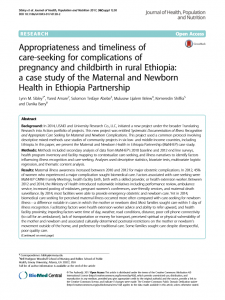
In 2014, USAID and University Research Co., LLC, initiated a new project under the broader Translating Research into Action portfolio of projects. This new project was entitled Systematic Documentation of Illness Recognition and Appropriate Care Seeking for Maternal and Newborn Complications. This project used a common protocol involving descriptive mixed-methods case studies of community projects in six low- and middle-income countries, including Ethiopia. In this paper, we present the Maternal and Newborn Health in Ethiopia Partnership (MaNHEP) case study.
Methods included secondary analysis of data from MaNHEP’s 2010 baseline and 2012 end line surveys, health program inventory and facility mapping to contextualize care-seeking, and illness narratives to identify factors influencing illness recognition and care-seeking. Analyses used descriptive statistics, bivariate tests, multivariate logistic regression, and thematic content analysis.
Improvements in illness recognition and care-seeking observed during MaNHEP have been reinforced since that time and appear to be successful. There is still need for a concerted effort focusing on reducing identified barriers, improve quality of care and provider counseling, and contextualize messaging behavior change communications and provider counseling.